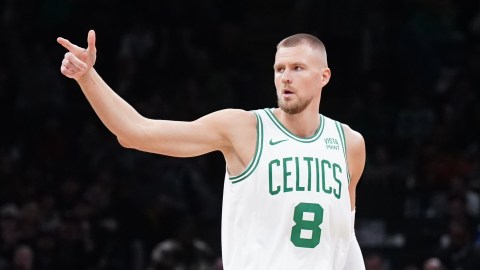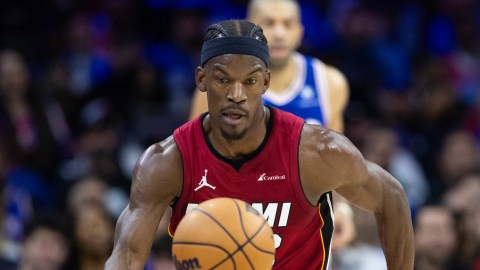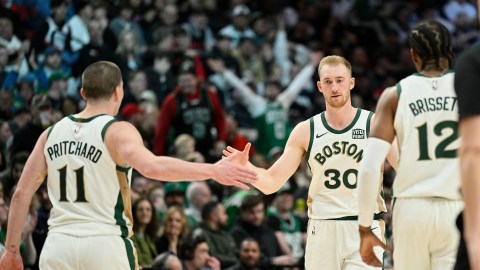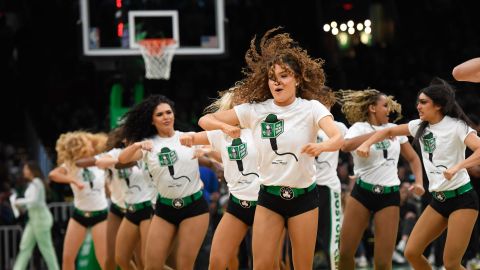 At 0-4, the Celtics just aren’t very good right now. There’s no contesting the team’s lack of ball-handling ability and a leader on offense, evidenced by their feeble 87.5 points per game scored thus far — second-worst to only the Cleveland Cavaliers in the NBA.
At 0-4, the Celtics just aren’t very good right now. There’s no contesting the team’s lack of ball-handling ability and a leader on offense, evidenced by their feeble 87.5 points per game scored thus far — second-worst to only the Cleveland Cavaliers in the NBA.
Second-half meltdowns have been problematic as well, including blowing a 22-point lead against Milwaukee in the most glaring of the losses.
There is a way to rebound the offensive woes, however — rebounding.
With just 38.5 boards per game, Boston ranks No. 28 out of 30 NBA teams in rebounding, and their numbers on the offensive glass — just 9.3 per game, tied for No. 24 on the list — are worse. With more defensive rebounds, a team generates more offensive possessions, and with more offensive rebounds, more high-quality scoring chances are generated. Simple, right?
It’s not like a bad team can’t rebound. Take the winless Utah Jazz, Boston’s opponent Wednesday night at TD Garden. They rank sixth in overall rebounding and are pulling down a league-high 16.5 offensive boards.
So, where does the solution lie? Enter: Kris Humphries.
The 6-foot-10 28-year-old is arguably the best rebounder the Celtics have on the roster (with all due respect to Vitor Faverani and Gerald Wallace), but he just simply isn’t logging the minutes.
Coach Brad Stevens indicated after Monday night’s loss to the Grizzlies that no minutes were available because of Faverani’s emergence, but the first-year coach may have no choice but to play his bench-ridden big man.
While Humphries’ numbers in the preseason — 2.1 rebounds in just 16 minutes per game — weren’t exactly favorable, his career numbers say otherwise.
Throughout his first eight NBA seasons, Humphries never averaged more than 20 minutes per game for an entire season, and his rebounding numbers were terrible, never rising higher than 3.7 per game. In the 2009-2010 season, however, Humphries was traded from Dallas, where he averaged 3.8 rebounds in 12.1 minutes, to the Nets (then of New Jersey), where he averaged 6.4 boards in 20.1 minutes of action.
It gets better. When Humphries finally received a starter’s share of the minutes, his numbers ranked among the top of the league. In 27.9 minutes of action the following season, Humphries averaged a career-high 10.4 rebounds per game. The season after that, 2011-12, he established a new career high with 11.0 rebounds per game in 34.9 minutes per night, by far the most he had ever received.
After falling out of favor with his coaches and teammates in Brooklyn, in addition to a failed marriage and divorce that was dragged through the media and public, Humphries averaged only 18 minutes per contest, and his rebounding numbers plummeted to just 5.6 per game.
Humphries has played just one game this season — the team’s opener in Toronto, where he may have only played because of forward Jared Sullinger‘s suspension. In 21 minutes of action, though, Humphries pulled in nine rebounds. Projected out over 35 minutes of action, which Humphries received during his best season, that averages out to exactly 15 rebounds per game. It’s an extremely small sample size, sure, but given his history, it’s one that cannot be ignored.
To concede, the Celtics don’t necessarily need Humphries to win going forward. With an already crowded frontcourt that includes Faverani, Wallace, Sullinger, Kelly Olynyk, Brandon Bass and Jeff Green, there understandably isn’t much room or many minutes for Humphries to play. Yes, the rebounding numbers are horrific, but, with all due respect to Jordan Crawford and his shocking top-15 Player Efficiency Rating (PER), the offensive woes are worse without a true traffic director on the floor.
Just look at the Miami Heat, who rank dead last in the league in rebounding. Yes, they’ve gotten off to a rocky start, but King James and company will be there at the end. Why? They spread the court and move the ball.
The definite benefit of having Humphries on the floor and playing major minutes, however, is two-fold in the meantime. The rebounding numbers will help, of course, but even more important is his contract. No. 43 is in the final year of a two-year, $24 million deal. A veteran player who rebounds at an above-average rate is a golden commodity in this league, and with no contractual commitment going forward, Humphries is an incredibly attractive trade asset.
If he plays.
For a rebuilding team with a talented young front line looking for cap space and draft picks in anticipation of a potentially loaded 2014 draft class, Humphries is the perfect candidate to go should anyone — even the Miami Heat, themselves — come knocking. But they won’t if he sits at the end of the bench wasting away.
Regardless of what the Celtics decide to do with Humphries, Stevens needs to insert him into the lineup now, because whatever he pulls in — whether it’s rebounds, cap space or draft picks — will help the Celtics in the long haul.



